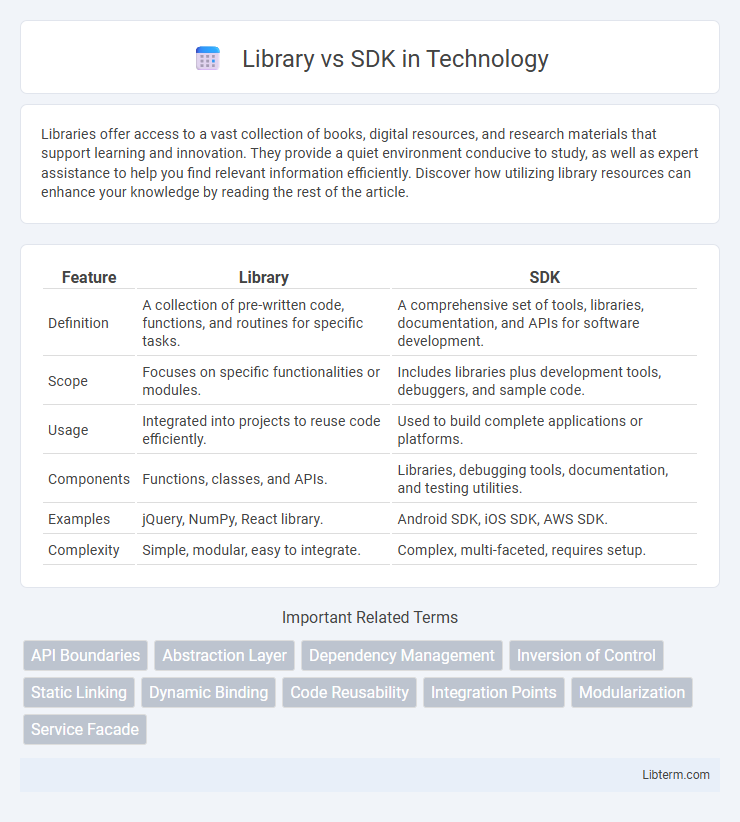Libraries offer access to a vast collection of books, digital resources, and research materials that support learning and innovation. They provide a quiet environment conducive to study, as well as expert assistance to help you find relevant information efficiently. Discover how utilizing library resources can enhance your knowledge by reading the rest of the article.
Table of Comparison
| Feature | Library | SDK |
|---|---|---|
| Definition | A collection of pre-written code, functions, and routines for specific tasks. | A comprehensive set of tools, libraries, documentation, and APIs for software development. |
| Scope | Focuses on specific functionalities or modules. | Includes libraries plus development tools, debuggers, and sample code. |
| Usage | Integrated into projects to reuse code efficiently. | Used to build complete applications or platforms. |
| Components | Functions, classes, and APIs. | Libraries, debugging tools, documentation, and testing utilities. |
| Examples | jQuery, NumPy, React library. | Android SDK, iOS SDK, AWS SDK. |
| Complexity | Simple, modular, easy to integrate. | Complex, multi-faceted, requires setup. |
Definition of Library and SDK
A library is a collection of pre-written code, functions, and routines that developers can use to optimize tasks and simplify software development. An SDK (Software Development Kit) includes libraries along with tools, documentation, and APIs designed to create applications for specific platforms or frameworks. While a library focuses on reuse of code components, an SDK provides a comprehensive environment for software creation and integration.
Core Differences Between Library and SDK
A library is a collection of pre-written code that developers call upon to perform specific tasks, offering focused functionality without dictating the application structure. An SDK (Software Development Kit) provides a comprehensive set of tools, including libraries, documentation, APIs, and debuggers, to build and integrate applications for a particular platform or framework. The core difference lies in scope: libraries offer targeted code reuse, while SDKs deliver an integrated development environment with multiple resources for end-to-end software creation.
How Libraries Work in Software Development
Libraries function as reusable collections of pre-written code that developers integrate into their projects to perform specific tasks without writing code from scratch. By linking or importing a library, software applications invoke its functions or classes directly, enabling faster development and consistent functionality. This modular approach reduces errors, enhances productivity, and supports code maintenance across various programming environments.
What an SDK Includes Beyond Libraries
An SDK (Software Development Kit) includes libraries alongside essential tools such as debuggers, documentation, code samples, and integrated development environments (IDEs) that facilitate software creation. Unlike libraries that provide pre-written code for specific functions, an SDK offers a comprehensive suite for application development, including APIs and testing utilities. This holistic approach enables developers to build, test, and deploy applications more efficiently within a particular platform or ecosystem.
Usage Scenarios: When to Choose a Library
A library is best chosen when developers need reusable functions or modules that can be selectively integrated into existing projects, allowing fine control over the application flow. It suits scenarios where specific features, such as data manipulation, graphics rendering, or network communication, are required without the overhead of a full environment. Libraries enable customization and modular development, making them ideal for enhancing or extending software capabilities in a targeted manner.
Usage Scenarios: When to Choose an SDK
SDKs are ideal for developers needing comprehensive tools and pre-built functionalities to build complex applications, such as mobile apps or integrated systems. They provide a complete development environment including APIs, documentation, and debugging tools, streamlining the creation process. Choosing an SDK accelerates development when extensive customization and full control over app features are required.
Advantages of Using Libraries
Libraries offer reusable code that simplifies development by providing pre-built functions and routines for common tasks, reducing programming time and errors. They enable better code maintainability and readability by encapsulating complex functionality, allowing developers to focus on core application logic. Access to mature, widely-tested libraries ensures higher software quality and faster implementation of features compared to building from scratch.
Benefits of Integrating an SDK
Integrating an SDK provides developers with a comprehensive set of pre-built tools, APIs, and functionalities that streamline the development process, enhancing productivity and reducing time-to-market. SDKs enable seamless integration of complex features such as authentication, analytics, and payment gateways, which may require extensive coding if implemented through libraries alone. This integration fosters better compatibility and support, allowing developers to leverage robust updates and documentation tailored to specific platforms or services.
Common Misconceptions: Library vs SDK
Many confuse a library with an SDK, but a library is a collection of pre-written code used to perform specific tasks, while an SDK (Software Development Kit) includes libraries, tools, documentation, and APIs designed to build applications for a specific platform. Another misconception is that SDKs are just bigger libraries, but SDKs provide a comprehensive environment for development beyond simple code reuse. Understanding the distinct roles of libraries as modular code and SDKs as complete development suites is essential for efficient software development.
Choosing the Right Tool for Your Project
Choosing between a library and an SDK depends on your project's scope and requirements. Libraries offer specific functions to enhance your code without dictating structure, ideal for simple, modular tasks. SDKs provide comprehensive tools, including APIs, debuggers, and documentation, suited for developing full applications or integrating complex services.
Library Infographic

 libterm.com
libterm.com